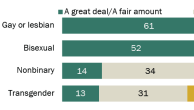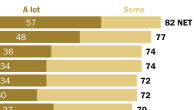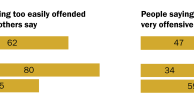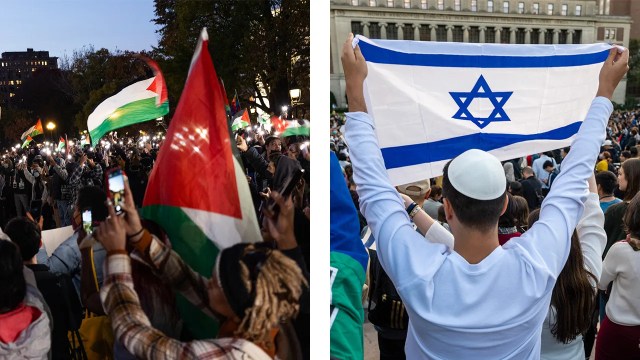
Pew Research Center conducted this survey to explore the U.S. public’s views on discrimination and free speech in the context of the Israel-Hamas war. We surveyed a total of 12,693 U.S. adults from Feb. 13 to 25, 2024. Most of the respondents (10,642) are members of Pew Research Center’s American Trends Panel, an online survey panel recruited through national random sampling of residential addresses, which gives nearly all U.S. adults a chance of selection.
The remaining 2,051 respondents are members of three other survey panels – Ipsos’ KnowledgePanel, SSRS’s Opinion Panel, and NORC at the University of Chicago’s AmeriSpeak Panel – who were interviewed because they identify as Jewish or Muslim.
We “oversampled” (i.e., interviewed a disproportionately large number of) Jews and Muslims to provide more reliable estimates of their views on the topics covered in this survey. But these groups are not overrepresented in the national estimates reported here, because we adjusted for the oversampling in the weighting of the data. The survey is weighted to be representative of the U.S. adult population by gender, race, ethnicity, partisan affiliation, education, religious affiliation and other categories. In total, 1,941 Jewish and 414 Muslim respondents participated in this survey.
While the sample design was identical for Jews and Muslims, the resulting sample sizes are different. There are two main reasons for this. The Jewish population in the United States is roughly double the size of the Muslim population. Consequently, national survey panels have roughly twice as many or more Jewish panelists as Muslim ones. In addition, decades of research on survey nonresponse has shown that some groups in the U.S. are more likely to participate in surveys than others. Generally speaking, Jewish adults are more likely to participate in surveys than Muslim adults.
The survey also included questions about where people were born and whether people identify as Arab or of Arab origin. Because of insufficient sample size, we are unable to analyze Arab Americans or Americans of Israeli or Palestinian descent separately.
In this survey, Jews and Muslims are defined as U.S. adults who answer a question about their current religion by saying they are Jewish or Muslim, respectively. Unlike our 2020 report on Jews in America, this report does not separately analyze the views of “Jews of no religion” (i.e., people who identify as Jewish culturally, ethnically or by family background but not by religion).
For more information on how we conducted this survey, refer to the ATP’s Methodology and the Methodology for this report. Read the questions used in this report, along with responses.
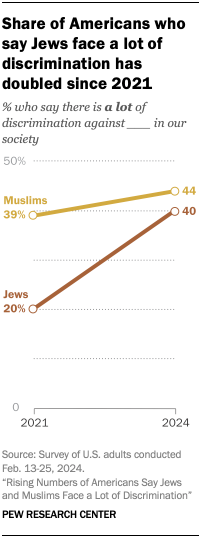
The share of U.S. adults who say there is a lot of discrimination against Jews in our society has doubled in the last three years, according to a new Pew Research Center survey, jumping from 20% in 2021 to 40% today. A somewhat larger share – 44% – say Muslims face a lot of discrimination, up 5 percentage points since 2021.
Many Americans particularly sense that discrimination against Muslims and Jews has risen since the start of the Israel-Hamas war. The vast majority of U.S. Muslims and Jews themselves agree: Seven-in-ten Muslims and nine-in-ten Jews surveyed say they have felt an increase in discrimination against their respective groups since the war began in October.
The survey, conducted Feb. 13-25 among a nationally representative sample of 12,693 U.S. adults that includes an oversample of American Jews and Muslims, also probed the public’s views on the limits of free speech related to the war.
It finds that Americans are broadly comfortable with speech both for and against Israeli and Palestinian statehood. But most U.S. adults are not OK with calls for violence against Jews or Muslims.
Pew Research Center surveys conducted on our American Trends Panel (ATP) always include Jews and Muslims. But these surveys do not always have enough Jewish or Muslim respondents to report their answers separately. This is because they make up relatively small shares of the U.S. adult population: Roughly 2% of Americans say their religion is Judaism, and 1% say their religion is Islam.
To provide more reliable estimates of Jewish and Muslim views on the topics covered in this survey, we included Jewish and Muslim respondents from three other national panels run by large research organizations (Ipsos, NORC and SSRS). All these panels are probability based, meaning they use random sampling methods to recruit respondents. They are not “opt-in” polls. In total, 1,941 Jewish and 414 Muslim respondents participated in this survey.
In this report, Jews and Muslims are defined as U.S. adults who answer a question about their current religion by saying they are Jewish or Muslim, respectively. Unlike our 2020 report on Jews in America, this report does not analyze the views of “Jews of no religion” (i.e., people who identify as Jewish culturally, ethnically or by family background but not by religion).
While the sample design was identical for Jews and Muslims, the resulting sample sizes are different. There are two main reasons for this. The Jewish population in the U.S. is roughly double the size of the Muslim population. Consequently, national survey panels have roughly twice as many or more Jewish panelists as Muslim ones. In addition, decades of research on survey nonresponse has shown that some groups in the U.S. are more likely to participate in surveys than others. Generally speaking, Jewish adults are more likely to participate in surveys than Muslim adults.
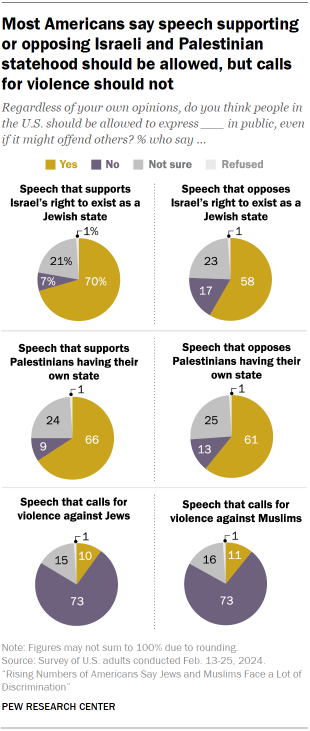
- 70% say expressing support for “Israel’s right to exist as a Jewish state” should be allowed.
- 58% say expressing opposition to Israel’s right to exist should be allowed.
- 66% say speech supporting “Palestinians having their own state” should be allowed.
- 61% say speech opposing a Palestinian state should be allowed.
- One-in-ten say calls for violence against either Jews or Muslims should be allowed.
On the questions about speech related to statehood, substantial shares of respondents are not sure. For example, 23% say they aren’t sure whether speech opposing Israel’s right to exist as a Jewish state should be allowed. And 25% say they aren’t sure whether speech opposing Palestinian statehood should be allowed.
When it comes to speech advocating violence, however, there is less uncertainty. Roughly three-quarters of Americans say that calls for violence against either Muslims or Jews should not be allowed.
The survey comes amid a flurry of news reports about antisemitic and anti-Muslim incidents in the United States, especially on college campuses, where fierce debates have erupted over the limits of free speech. For many Jewish and Muslim Americans, these debates are not just ideological, but personal:
- 74% of U.S. Jews and 60% of U.S. Muslims surveyed say they have felt offended by something they saw on the news or social media about the Israel-Hamas war.
- 27% of Muslims and 26% of Jews in the survey say they have stopped talking to someone in person – or unfollowed or blocked someone online – because of something that person said about the war.
A previous Pew Research Center report, based on the same survey, examined the U.S. public’s views on the war, including questions about:
- The acceptability of Hamas’ Oct. 7 attack and Israel’s military response
- Americans’ attention to the war
- Americans’ knowledge about the war
- The emotions the conflict has unleashed
In this report, we focus on perceived levels of discrimination against Jews, Muslims and Arab people in the U.S. For context, we analyze perceptions of discrimination against other religious, racial and ethnic groups, including evangelical Christians and Asian, Black, Hispanic and White Americans (Chapter 1).
We also delve into public attitudes toward speech related to the war, including how these views vary by age, education, political partisanship and other demographic factors (Chapter 2).
How much discrimination do U.S. Jews and Muslims see against their own group?
The vast majority of U.S. Muslims surveyed (85%) say there is at least some discrimination against Muslims in our society today, including 67% who say there is a lot. Overall, Muslim respondents are more likely to feel there is at least some discrimination against their own religious group than to say the same about Jews (50%).
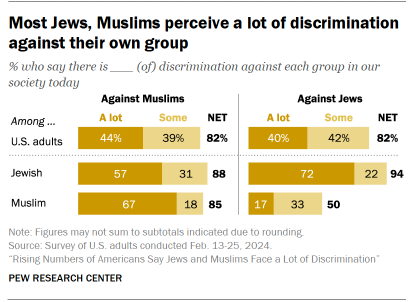
An overwhelming majority of U.S. Jews (94%) say there is at least some discrimination against Jews in our society, including 72% who say there is a lot. And more say there is a lot of discrimination against Jews than say the same about Muslims (57%).
For Jews, this represents a shift: In our 2020 and 2013 surveys of American Jews, they were more likely to say that Muslims (as well as Black people) face a lot of discrimination than to say this about themselves.1
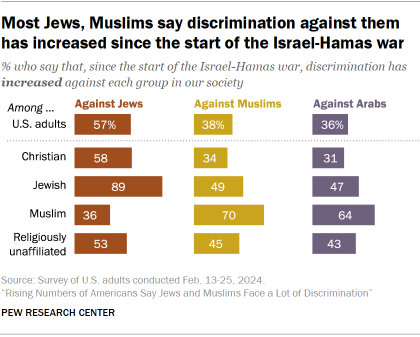
The change in Jewish Americans’ perceptions appears to be tied, at least in part, to the conflict in the Middle East: 89% of Jewish respondents say they have perceived a rise in discrimination against Jews since the start of the Israel-Hamas war.
They are not alone in feeling the effects of the conflict. Seven-in-ten Muslim respondents say discrimination against Muslims has risen since the start of the war. (Jewish and Muslim Americans are also paying greater attention to news about the Israel-Hamas war than most other Americans.)
In addition, most Muslims and nearly half of Jews say discrimination has increased against Arabs since the war began.
Unlike most U.S. polls, this survey has enough Jewish and Muslim respondents to allow their opinions to be broken out separately. Although Arab Americans also are included in the survey, there are not enough of them to reliably represent the views of Arab Americans as a whole. All three groups are very small in proportion to the overall U.S. population, which makes it hard to get a representative estimate through random sampling alone.
Free speech and the Israel-Hamas war
The survey included several questions to gauge tolerance for public speech about Israeli and Palestinian statehood, asking whether people in the U.S. should be able to express these sentiments – even if they might offend some people. Outright opposition to these expressions of opinion are relatively rare; instead, sizable shares say they are unsure. In contrast, most Americans say public speech calling for violence against Jews or Muslims should not be allowed.
Like the public overall, a large majority of U.S. Jews are in favor of allowing people to express support for Israel’s right to exist as a Jewish state (92%). Majorities of Jews also say speech either supporting (77%) or opposing (74%) Palestinians having their own state should be allowed. But Jews are less likely to say this about speech opposing Israel’s right to exist as a Jewish state: 55% say this kind of speech should be allowed, while 34% say it should not be allowed.
Similarly, a solid majority of U.S. Muslims say that speech supporting a Palestinian state should be allowed (70%). About half of Muslims say people should be allowed to express support for (47%) or opposition to (50%) Israel’s existence as a Jewish state. And 43% of Muslims say that speech opposing a Palestinian state should be allowed; 27% say this kind of speech should not be allowed, and 28% are unsure.
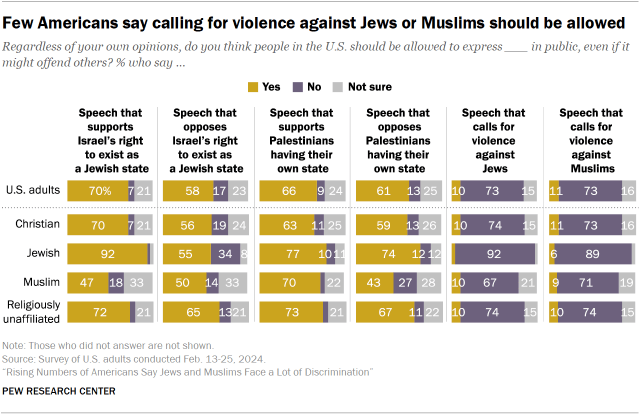
Like many public attitudes toward the Israel-Hamas war, opinions on these issues vary depending on people’s age, political party and education:
Age
- Compared with other age groups, Americans 65 and older are more likely to say there is a lot of discrimination against Jews in our society today. Older Americans are far more likely to report an increase in discrimination against Jews than against Muslims or Arabs.
- By contrast, Americans ages 18 to 29 are more likely to say that Black, Muslim, Arab and Hispanic people experience a lot of discrimination than to say the same about Jews. Adults under 30 are equally likely to perceive an increase in discrimination against Muslims, Arabs and Jews since the start of the Israel-Hamas war (47% each).
- People ages 65 and older are the most likely to say they have felt personally offended by something they saw on the news or social media about the war (41%).
- Adults under 30 are the most likely to say they stopped talking to someone, or unfollowed or blocked someone online, because of something that person said about the Israel-Hamas war (16%).
Partisanship
- Democrats and Democratic-leaning independents are generally more likely than Republicans and Republican leaners to say there is a lot of discrimination against the groups asked about in the survey; Democrats are most likely to say there is a lot of discrimination against Black people (62%), Muslims (61%), Arab people (55%) and Jews (41%).
- Republicans are most likely to say there is a lot of discrimination against Jews (40%), followed by Muslims (27%), evangelical Christians (24%) and White people (24%).
- Democrats are about twice as likely as Republicans to say that, since the start of the Israel-Hamas war, discrimination has increased against Muslims (52% vs. 26%) and Arabs (49% vs. 23%).
- Republicans (61%) and Democrats (57%) largely agree that discrimination against Jews has increased since the outbreak of the war.
- Republicans and Democrats are also broadly in sync on the survey’s questions about speech. They largely are in favor of allowing expressions for or against statehood, but do not think calls for violence should be allowed.
Education
- Americans with at least a college degree are more likely than those with less education to say discrimination against Jews, Muslims and Arabs has increased since the start of the Israel-Hamas war.
- People with at least a college degree are far more likely than those with less education to say that speech supporting and opposing Israeli or Palestinian statehood should be allowed. Those with lower levels of education are much more likely to say they are unsure.
